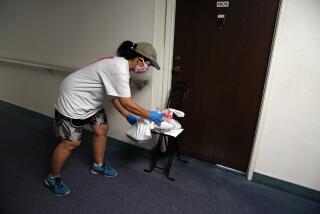Desperate Russians won’t turn up their nose at expired food
MOSCOW — The cheeses are spotted with mold. The sausages are ominously gray. Slime is beginning to overtake the chicken.
But the stooped and slow clientele who crowd this pungent stretch of market stalls in the southern fringes of the Russian capital don’t seem bothered. Elderly retirees mass and push before spreads of lukewarm yogurt and moldering fish. Business has never been better, the steely-eyed manager says.
Theoretically, selling expired foodstuffs is a crime punishable by fine under Russian law. But the climbing prices, falling salaries and withering demand of Russia’s economy appear to be driving a surge in the sale of past-their-prime goods.
Trafficking in spoiled food, a familiar racket during the chaotic collapse of the Soviet Union, is making a comeback in both markets and wholesale Internet shopping. A semi-underground enterprise, it is difficult to trace. But consumer groups, shoppers and anecdotal evidence all indicate its ascendance.
“If you lower the price to pennies, people will buy it even at the risk of being poisoned,” says Irina Vinogradova, director of the Russian Institute of Consumer Evaluation. “This crisis has led some people into a situation where they have absolutely no money to survive on.”
Outside the market, known as the Moskvoretskoye, Galina Abrosimova shows a tub of cottage cheese she bought for about 30 cents. The cheese is tepid; the date on the lid shows it expired two weeks ago.
“So what?” she says, tucking it shyly back into a dirt-smeared shopping bag. “If I don’t like the taste, I’ll just use it for pancakes.”
Abrosimova, 82, is a retired construction engineer who has carefully painted her lips pink before venturing forth into the world. Her overcoat is grimy and her flat shoes scuffed, but she has draped a lace scarf around her throat and covered her white hair with a brunet wig.
She lists the cheapest places she has found to scrounge for spoiled food in Moscow. The Moskvoretskoye is the market for dairy, she says. Fruit and vegetables are cheapest at a market near her house, where one aisle is set aside for expired goods.
Abrosimova can’t afford meat, but she knows a canning factory in the far northern suburbs out by the railroad tracks that unloads lightly rotten fish for pennies.
“They sell some horrible stuff there,” she says. “It makes you sorry to see it.”
But she goes every week, scavenging several days’ worth of fish for about $1.20.
Like many of the shoppers here, Abrosimova had been buying spoiled food even before the crisis hit. Supermarkets are an impossible dream for many of Russia’s retirees, surviving on pensions. They spend their days shuffling from one far corner of Moscow to the next, hunting the best bargains.
Most Russians still haven’t been forced to buy spoiled food. But these days, Abrosimova shrugs, she’s competing with bigger crowds. You can’t be lazy, she says -- you have to arrive early. And you have to understand how to handle the food, shoppers warn sagely, to discern between slightly spoiled and potentially sickening.
“You have to be careful with meat,” says Nikolai Terekhov, 69. “The part that looks weather-beaten has to be cut off and boiled or roasted for a very long time.”
Terekhov trained as a doctor and served in the Soviet military in Germany. Now he wanders from the market, gazes up the road through foggy glasses and jokes, “The buses look like hearses, bringing loads of old people here.”
But he shrugs it off. “You have to survive. You have to adjust. That’s our life,” he says. “We’ve been adjusting all our lives.”
In the middle of the market, a group of middle-aged men clusters around a metal table, swapping newspaper sections and running eyes over their domain. They wear suits or leather; they look tough and wary, as if they were sent over from a “Sopranos” casting call. When they notice a foreign reporter wandering from stand to stand, they send over a pair of burly security guards in black jumpsuits to hover along.
“What are you doing? You can’t take photographs here,” one of the guards says, although nobody is taking photographs and the only camera is in a bag, out of sight.
Staring and muttering, the men at the metal table fan out to the market stalls and, one after the next, shutters crash to the floor, hiding the food from sight. Bang! There goes the moldering fish. Bang! The expired goose liver pate. Bang! The old milk.
The elderly shoppers blink around in confusion. The market isn’t supposed to close for hours yet.
The manager’s name is Pyotr Aksyonov. As the shutters clang to the ground, he comes strolling over.
“Let me put it this way,” he says of the expired food. “Some deviations are found everywhere, and here is no exception.”
He pauses, then adds, “We weren’t prepared for your visit.”
There is a system, Aksyonov says. The market thrives by accepting damaged and leftover goods from the nearby factories and warehouses, thereby cutting down on transport costs. And, sure, why not sell dented cans or crumpled boxes? The contents, he insists, are still good. Or at least, good enough.
Aksyonov’s business has been booming, he adds, since the financial crisis struck. As for the authorities, he insists that his market is subjected to regular inspections, and always passes muster. Times are tough, he shrugs, and anyway, his market is providing a service.
“Low-income and even lower-middle-class people who lost their jobs can no longer afford supermarkets,” he says. “We are trying to accommodate them. We are trying the best we can to make them able to buy something.”
--
More to Read
Sign up for Essential California
The most important California stories and recommendations in your inbox every morning.
You may occasionally receive promotional content from the Los Angeles Times.










